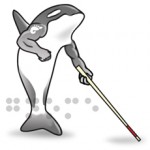Introduction:
- Apologies for the delays in releasing new episodes.
- This episode is an interview with Jonathan Nadeau of Frostbite Systems and a user of the Linux screen-reading program, Orca.
Interview:
- Orca is a screen reading program integrated with the Gnome desktop. It's available for most Linux distributions.
- Russ and Jonathan discuss how a sight-impaired individual might install Linux. There are a couple of Linux distributions that have screen-reader support during the installation: Talking Arch Linux and Vinux.
- Speakup is another accessibility tool, but one that speaks the command line.
- Vinux is an Ubuntu-based Linux distribution with Orca built-in, allowing a sight-impaired individual to install it from the CD. Vinux is the distribtion Frostbite Systems normally installs for it's sight-impaired customers.
- Slackware has a Speakup kernel, and more distributions are including the Speakup module as well. Several distributions can be installed using Speakup. Some instructions are available at the Speakup site.
- Russ mentioned the Quick Learning Techies Show (QLTS) that also occasionally discusses accessibility issues.
- Jonathan discusses the pros and cons of Vinux, as well as his concerns about it being Ubuntu-based.
- Richard asks Jonathan for more details about how Vinux talks a new user through the install.
- If the application is GTK-based, it will likely work with Orca; if it's QT-based, it probably won't work with Orca.
- Ted's software (WA0EIR), including PSK31LX, works via ssh, so the programs are controllable from the command line and would work with the Speakup module.
- Meanwhile, Russ attempts to install Orca during the show.
- Jonathan mentions another podcast he does, This Week in Fedora, and says there is an amateur radio Fedora spin. (I could not find a link to a specific spin of Fedora for amateur radio, but there is a Special Interest Group. -Ed.)
- Frostbite Systems sells desktops and laptops with Linux pre-installed. Customers can choose from Debian, Fedora, Linux Mint, OpenSuse, Ubuntu and Vinux. A portion of each sale is donated back to the distribution chosen.
- Russ asks Jonathan about the hardware he uses in Frostbite systems. All of the laptops/notebooks have all-Intel hardware, while some desktops have nVidia video cards. All are completely Linux-compatible.
- Russ then examines the specifications of some of the Frostbite computers.
- Jonathan also produces several podcasts through Frostbite Media:
- Frostcast: interviews with project leaders of various GNU/Linux and Free/Open Source projects.
- This week in Fedora: interviews with people involved with the Fedora project.
- This week in Debian: interviews with people within the Debian community.
- Orcacast is on hiatus, but should resume in the not too distant future.
Contact Info:
- Contact Richard at kb5jbv@gmail.com, Russ at k5tux@lhspodcast.info, or both at the same time at info@lhspodcast.info.
- Listen to the live stream every other Tuesday at 8:00pm Central time. Check the LHS web site for dates.
- Leave us a voice mail at 417-200-4811, or record an introduction to the podcast.
- Sign up for the LHS mailing list.
- Sign up for the MAGNetcon mailing list.
- LHS merchandise is available at the SHOP! link on Web site. Check out the Badgerwear or buy one of the other LHS-branded items at PrintFection.com/lhs or Cafe Press. Thanks!
- Thanks to Dave from Gamma Leonis for the theme music.
Outtakes:

